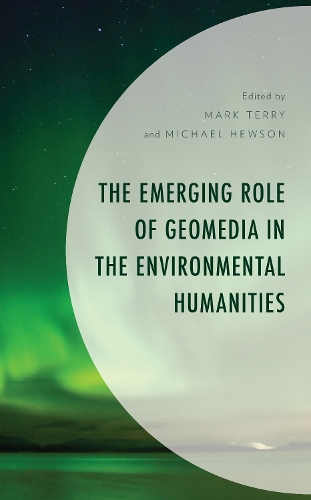
The Emerging Role of Geomedia in the Environmental Humanities
(Hardback)
Publishing Details
The Emerging Role of Geomedia in the Environmental Humanities
By (Author) Mark Terry
Edited by Michael Hewson
Contributions by Pamela Carralero
Contributions by Murray Herron
Contributions by Michael Hewson
Contributions by David S. Jones
Contributions by Netta Kornberg
Contributions by Michael John Long
Contributions by Phillip Ros
Contributions by Susan Ryan
Bloomsbury Publishing PLC
Lexington Books/Fortress Academic
3rd October 2022
United States
Classifications
Professional and Scholarly
Non Fiction
Nature and the natural world: general interest
Conservation of the environment
Sociology
910.285
Physical Properties
Hardback
208
Width 159mm, Height 239mm, Spine 19mm
458g
Description
The Emerging Role of Geomedia in the Environmental Humanities, edited by Mark Terry and Michael Hewson, provides the latest scholarship on the various methods and approaches being used by environmental humanists to incorporate geomedia into their research and analyses. Chapters in the book examine such applications as geographic information systems, global positioning systems, geo-doc filmmaking, and related geo-locative systems all being used as new technologies of research and analysis in investigations in the environmental humanities. The contributors also explore how these new methodologies impact the production of knowledge in this field of study as well as promote the impact of First Nation people perspectives.
Reviews
This intriguing book transcends academic disciplines to invite new provocations about maps, stories, images, and places in the digital age. It is a unique contribution to environmental studies that reads like a comet, leaving notable traces and teachings for ecological storytelling including those shared by young people, ecofeminists, Indigenous communities, and geographers.
-- Kate Tilleczek, York University"A fascinating look at the various theoretical frameworks, technologies, methods, and approaches to new and emerging applications of geomedia as a communications and pedagogical tool for understanding global issues. The scholars in this book share compelling research and case studies that demonstrate the historical, temporal, and spatial affordances of geo-locative applications that combine to provide additional context to complex global issues currently being studied. This book serves as a resource to using geomedia in these new and productive ways."
-- Charles Hopkins, UNESCO Chair in Reorienting Education towards Sustainability"This wide-ranging, interdisciplinary anthology brings together original and timely ecocritical work that explores the power of GIS and geomedia to address important questions of environmental justice. Committed to a critical pedagogy firmly rooted in an environmental humanities framework, the chapters in this collection provide valuable resources for researchers, teachers, and policy makers to understand climate shift from a humanities perspective."
-- Markus Reisenleitner, York UniversityShaping a just and sustainable future requires bold ideas and bold actions. As the editors of this volume argue, mapping is a powerful form of storytelling that can educate, engage, and enable critical reflections on the dire ecological emergency and environmental injustices of our time. The volume chapters span important meta-themes linked to Indigenous scholars geographical information methods, integration of cultural with biophysical datasets, and classroom-based engagements. The Emerging Role of Geomedia in the Environmental Humanities is a must read for those wanting to extend possibilities for how we evolve stories that shift society in a more just and sustainable direction.
-- Alice J. HovorkaAuthor Bio
Mark Terry is contract faculty professor in the Faculty of Environmental and Urban Change at York University.
Michael Hewson is senior lecturer in geography at Central Queensland University.
